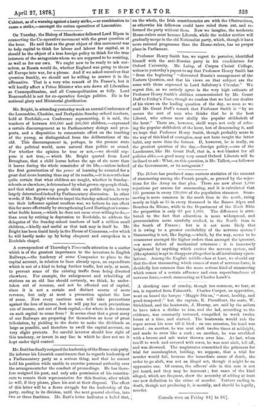Mr. Bright, in attending yesterday week an annual Conference of
the Lancashire, Cheshire, and Derbyshire Sunday-school teachers, -held at Rochdale,—a Conference representing, it is said, the teachers of between 400,000 and 500,000 children,—expressed a certain discouragement as to Parliamentary doings and pros- pects, and a disposition to concentrate effort on the teaching of the young, as distinguished from the deliberations of the old. This discouragement is, perhaps, in the present state of the political world, more natural than politic or sound. For whether the opinion be true or not,—we should sup- pose it not true, — which Mr. Bright quoted from Lord Brougham, that a child learns before the age of six more than it learns during the whole remainder of its life,—unless indeed the first germination of the power of learning be counted for a great deal more learning than any of its results,—it is nevertheless -quite certain that what children are taught, whether in Sunday- schools or elsewhere, is determined by what grown-up people think, and that what grown-up people think on public topics, is very largely determined indeed by Parliamentary discussion. In other words, if Mr. Bright wishes to impel the Sunday-school teachers to use their influence against needless war, we believe he can effect this far more effectually by strengthening Lord Hartington's some- what feeble knees,—which he does not seem over-willing to do,— than even by retiring in depression to Rochdale, to address the -delegates of the Sunday-school teachers of half a million small -children,—kindly and useful as that task may in itself be. Mr. Bright has been timid lately in the House of Commons,—for which he will hardly make up by being eloquent and outspoken in a Rochdale chapel.


































 Previous page
Previous page